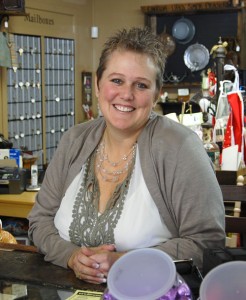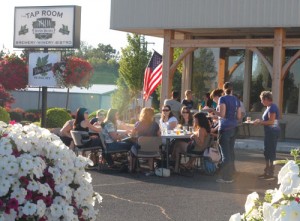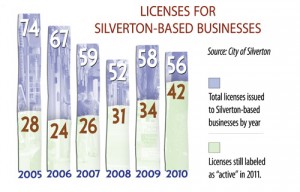Sitting in Creekside Grill’s lounge, relaxing at the end of a long day, Molly Ainsley is still making her pitch. Her product: SortaSausage, a vegetarian substitute for ground meat, made with soy and vegetables. It’s like a loose ground meat, with a Middle-Eastern flavor profile, she said, a little on the spicy side, with tomato and garlic.
And it’s really good, she doesn’t mind saying.
Ainsley started selling SortaSausage in April 2010. Today, her life is a blur of product demonstrations, meetings with vendors and potential buyers, orders and deliveries. She does everything for her company, even putting on her apron and helping make batches for the larger orders, the way she used to in her kitchen at the now-closed Rolling Hills Bakery and Café.
“If I don’t do it, absolutely nothing would happen,” she said. “I’m always in charge, which I guess is what I want, or I wouldn’t be doing this.”
Ainsley hopes her vegetarian meat substitute will help reduce meat consumption. SortaSausage may or may not reach that goal, but businesses like SortaSausage LLC may be a promising sign for the economy of the Mid-Willamette Valley, and offer a clue into how area businesses are surviving and even growing during tough economic times.
Oregon ranked fifth
A study by the University of Nebraska Lincoln’s Bureau of Business Research released in July of this year found that Oregon ranked fifth nationwide in a state entrepreneurship index. Among the factors taken into account by the study were percent increase in employer establishments per capita, and the rate of businesses formed. Touted by Oregon Secretary of State Ted Wheeler in an August press release, the study found that only New Jersey, Massachusetts, Washington and New York ranked higher.
What makes it so interesting for Oregon is that the same study in 2008 ranked Oregon 45th.
It’s a positive leading indicator, Robert Wiltbank said.
Wiltbank is an associate professor of strategic management for the Atkinson Graduate School of Management at Willamette University and a partner at Montlake Capital, a growth stage venture investment firm headquartered in Seattle, Wash.
“It doesn’t mean our economy is good,” he said, “but it should make us optimistic about where the economy is headed.”
Mixed reactions
The quick jump “is kind of shocking,” said Stacy Palmer, executive director of the Silverton Chamber of Commerce, but to her, Oregonians taking on new challenges are not that surprising. Oregon has a unique spirit that encourages entrepreneurial activity, she said.
“It’s got that dreamer mentality,” she said.“If you want a fresh beginning, Oregon is the place to do that.”
Not everyone agrees with the optimism elicited by the study. Scott Sadler is a certified professional coach and owner of Sadler Business Coaching in Salem. He consults with prospective small business owners to develop their strategies. His outlook is markedly dimmer.
“I’m in the trenches,” he said.“I’m seeing a lot of frustrated people not sure what to do next.”
Sadler said the biggest stumbling block to prospective entrepreneurs remains a lack of capital to start-up new businesses. Very few companies are willing to spend for services or equipment upgrades, and very little cash is available, he said. Measures 66 and 67, coupled with a high minimum wage and capital gains tax, have combined to create a chilling effect on the business climate, he said.
Moreover, a large number of those new businesses hinted at in the study may be a direct result of large numbers of qualified unemployed workers unable to get back to work, he said. With unemployment running out, more are turning to self-employment or consulting as a last-ditch effort to overcome a depressing jobs market, Sadler said.
That assessment may be true in some cases, Wiltbank said, but not overall.
“I don’t think it’s a big part of the story,” he said. “A lot of successful entrepreneurs started long before the economy went bad.”
Wiltbank said in business, success depends more on the niche each company serves, than the overall economy. It’s about where your customers are, he said.
And apparently many think there are customers in Silverton.
A look at Silverton business licenses issued for the last seven years shows a mixed bag, with overall only a modest drop in the number issued between 2005 and 2010. Business licenses are issued for anyone wishing to do business in Silverton, no matter where the company or individual is based. Many licenses are issued to suppliers and contractors from throughout the Pacific Northwest region doing work in town, as well as neighboring communities. Licenses are also issued to many “home offices,” or people working from home.
In 2005, 136 licenses were issued; in 2010, the number was 115. Businesses actually based in Silverton numbered 67 in 2006; in 2010 the number was 56. Since the low in 2008 of 98 licenses issued, with 52 being Silverton-based businesses, the number has remained fairly steady.
Of all the business licenses issued in 2010, 50 are now either inactive or closed. However, of those, 35 were construction businesses, an industry by and large still struggling to recover from the housing crisis of 2007.
 Palmer feels optimistic about the business activity in Silverton right now. She notes recently opened storefronts like Whimsy, Etc; The Mercantile, and the planned opening of Freilinger Electronics’ Radio Shack on Nov. 5.
Palmer feels optimistic about the business activity in Silverton right now. She notes recently opened storefronts like Whimsy, Etc; The Mercantile, and the planned opening of Freilinger Electronics’ Radio Shack on Nov. 5.
Silverton has positioned itself to assist small businesses, she said, with programs like urban renewal grants and loan programs that assist smaller businesses looking to expand and create more jobs.
The city also has a revolving loan program, which offers up to $25,000 to business property owners looking to make structural renovations to their buildings. Efforts through Community Development Director Steve Kay’s office to make life easier for business owners include a downtown master signage plan, economic development surveys and the drafting of the Silverton Industrial Park Strategic Plan in April.
Local advantage
But perhaps the biggest advantage for local business just may be the local.
A large number of businesses here are not only locally owned, but also independent. From the Palace Theater to The Red Bench, businesses tend toward boutiques and independent entities as opposed to regional or national franchises, Palmer said. And there’s a culture of “local.” Residents appreciate the importance of shopping locally, she said, and are making the effort to support their local businesses.
It’s what Ainsley learned during her time running the Rolling Hills Bakery and Café. As she struggled with the restaurant toward the end, friends and local volunteers would come in to help bake the pastries, rolls and Sorta bagels, with only a few fresh rolls as compensation.
“Their message to me was, [the bakery] is a part of our community, and we want to keep it open,” she said.“It was a beautiful thing.”
“Communities know the impact their dollars have,” Palmer said.
And so does one blossoming brewery at the north edge of town.
Businesses attract tourists
On the last Saturday in September, more than 200 people made their way to the Seven Brides Taproom on North First Street, for “Septoberfest,” an Oktoberfest-inspired celebration of the area’s fresh hops. Inside were taps from 12 different Oregon brewers, including Gilgamesh, Alameda, Bridgeport and Ram, all offering samples of their brews while Silverton native Matthew Price and his band performed on stage.
For co-owner Jeff DeSantis, supporting the local economy is more than just a business strategy.
“Our hope is that the community supports us, so we damn well better support them,” he said. “For us, it’s about Silverton, we want to be known as Silverton’s brewery.”
To that end, the entire brewing process is kept as local as possible. Grains come from Vancouver, hops from Mount Angel, yeast from Hood River and city water. The brewery also distributes the spent grain from the brewing process to lo cal farmers as livestock feed. When the brewery purchased the Copeland Lumber warehouse to convert into a restaurant and pub as well as brewing facility, they hired local plumbers, electricians and insulators to do the work. The emphasis on local carries over into suppliers. The beer is distributed through General Distributors out of Oregon City.
cal farmers as livestock feed. When the brewery purchased the Copeland Lumber warehouse to convert into a restaurant and pub as well as brewing facility, they hired local plumbers, electricians and insulators to do the work. The emphasis on local carries over into suppliers. The beer is distributed through General Distributors out of Oregon City.
For DeSantis, all this goes beyond just buying and selling locally. He wants to help other local businesses.
To that end, he has worked with The Oregon Garden to develop cross-promotional vacation packages that include two-night stays at the hotel, and complimentary beer tastings and discount on beer cases. Seven Brides is also completing a plan with local merchants to repeat a popular “Men’s Night Out” event that allowed patrons to complete their Christmas shopping at the Taproom, while watching a game and having a beer.
According to DeSantis, 30 percent of the Taproom’s business is new customers, out-of-town customers.
“People don’t just come to Silverton once,” he said.
It’s his goal to ensure this business returns, and spreads to the rest of the community.
Business people need to recognize that it’s not about what government can do for them, or customers, or even what they do for customers, DeSantis said. It’s about businesses banding together to support each other and the community, and to create opportunities for one another.
“It’s about what we can do for us,” he said. “There’s got to be a change in how we do what we do.”
How they do what they do at Seven Brides has led to a great deal of growth in the past few years. Output has gone from 50 barrels in 2008, brewed in DeSantis’ workshop, to a projected 1,500 barrels by end of 2011. Today, the brewery employs 19 people, including catering and kitchen staff, brewers, servers and an events coordinator.
Money stays in town
Sixty percent of every dollar spent locally stays in the community. Their paychecks are spent in town, on groceries, gas, and school, DeSantis said.
Even those no longer with the company benefited from the experience made possible by local jobs. From his seat in the Taproom, DeSantis recites a list of former employees, with updates on where each one is, and what he or she has accomplished since leaving. And as he does, he appears almost like a proud father bragging on his children.
The business is part of the family, he said. “And our family is a part of Silverton.”
For someone who’s been on unemployment for over a year, waiting to hear back from countless interviews with faceless corporations, it can be an awfully inviting image.
But can focusing on local help the economy? It couldn’t hurt, Sadler said.
“What’s the alternative?” Sadler said. “I think it’s a huge piece of the solution, but will it save the economy? Who knows?”
“It’s certainly an opportunity we’re fortunate to have,” Palmer said, “It won’t fix our economic woes, but it will add to stability.”
Ultimately, starting a business cannot be about saving the world, or even making it a better place: It must be about making money. And making money in business is incredibly difficult.
“It takes blood and sweat,” Palmer said.
The biggest obstacle, Wiltbank said, is finding people that will “give you money for what you are offering.”
“It’s true from the smallest little coffee shop to the biggest corporation,” he said.
“The truly successful focus in on that segment of the business.”
Most start-up companies do not succeed, Sadler said. He regularly sees people with no background in business attempting to build a dream, dumping endless time and money into it while trying to maintain household expenses. “It’s a pressure cooker,” he said.
And as Ainsley has discovered, a business must be about making money doing something you’re passionate about. She works six to seven days a week, generally waking up at around 4 a.m. worrying about something related to her business, and forcing herself to call it quits around 7 p.m.
“I have to create my social life. I have to create my downtime,” she said. “Otherwise, I would work all the time because I love it!”
